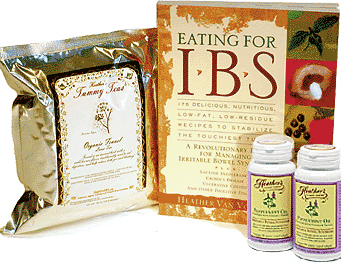| |

Did your email mangle this newsletter? Copy and paste this address into your browser window:
http://www.helpforibs.com/news/newsletter/051005.html or go here to see it online.

May 10, 2005
This week - New Acacia Cans on Sale, Plus Fibromyalgia and IBS
Hello to everyone -
If you missed last week's newsletter, we've got one more week of a special sale just for members of the IBS Newsletter. Our Acacia Tummy Fiber is now in cans!! The cans hold a full pound of Acacia, the only organic, prebiotic soluble fiber developed specifically for the dietary management of IBS, and can be easily re-filled with Acacia from the bulk foil bags.
Even better, we have an ongoing special rebate offer for people who buy at their local stores, and we have new store announcements this week as well.
Our IBS recipe this month is something a little unusual, and extra delicious. It's an almond horchata, which is a Mexican iced drink. The high soluble fiber content of almonds, plus the addition of Acacia, makes this a really safe drink, particularly because the nuts are so finely ground. It's a sweet and soothing end to the coming hot summer days. Plus, as always, we've got the latest IBS news and research, too. Enjoy!
Best Wishes,
Heather Van Vorous
Did a friend send you this newsletter? Sign up here for your own free subscription.

Mexican Cinnamon-Lime Horchata
Makes 4 Servings
If you wish to double this recipe, make two separate batches or you will overfill your blender.
1 Tablespoon Acacia Tummy Fiber (optional)
1 cup sliced almonds
2 cup boiling water
1 large cinnamon stick, broken into pieces
grated zest from one lime
1/2 cup granulated sugar
2 cups crushed ice cubes
In a blender combine all ingredients except ice. Let sit for 15 minutes (the boiling water will soften the almonds). Blend mixture on high speed for 3-4 minutes. Add ice and blend for 2 minutes.
Slowly pour mixture into a large pitcher through a fine mesh sieve or a double layer of dampened cheese cloth, pressing hard on solids to extract as much liquid as possible. Discard solids. Chill the filled pitcher until cold, and preferably overnight.
For oodles of other delicious recipes, come visit the IBS Recipe Exchange board!
Are you just learning how to eat for IBS? A little intimidated at the thought of special IBS recipes? Not quite sure just what makes these recipes special in the first place? Don't worry! Come see
the IBS Diet pages, and find the answers to all your questions.

Try the IBS Diet Kit #1 - for Bloating & Gas!
Here's the immediate, tangible help you need to take control of your IBS symptoms through diet. Includes the book Eating for IBS, Fennel Tummy Tea, and Peppermint Oil Tummy Tamers. Relieve IBS bloating & gas, and prevent painful spasms!
 Heather's Tummy Fiber Acacia is Now in Cans and On Sale!
Heather's Tummy Fiber Acacia is Now in Cans and On Sale!
For one more week only, we have a special sale on our brand-new Acacia cans just for members of the IBS Newsletter! The cans have just been introduced to a small but growing number of retail stores across the country, and they're not yet available to our general website audience - just to you!
As a special note here, our products will always be available for less at retail stores, and we'd really like to give people a great incentive to start shopping for Tummy Care products locally. So, for your first purchase at a local retail store, we'll refund 50% of your purchase price - up to a $50 rebate! Simply send us your receipt (our address is at the bottom of this newsletter), and we'll send you your rebate. We have three new local retailers to announce this week:
California
Angela Vittucci, R.D. & Associates
7107 Broadway #305
Lemon Grove, CA 91945
619-469-4930
Harvest House
2395 Monument Blvd
Concord, CA 94520
925 676 2305
Nevada
Herbally Grounded
4441 W. Charleston Blvd.
Las Vegas, NV 89102
702-558-4372
If you don't have a store in your area carrying Tummy Care products yet (you can give them this flyer to ask them), the only way to buy Acacia in cans is through this newsletter link.
In addition, we have a special introductory sale on Acacia cans, plus an even better bargain on an Acacia package deal!
If you're new to Acacia, it's an organic medical food specifically for the dietary management of IBS. Studies have shown that soluble fiber, as part of the diet, regulates bowel motility (alleviating both diarrhea AND constipation), and relieves abdominal pain from IBS. Acacia's prebiotic effect also stimulates the growth of healthy gut flora, which in turn reduces bloating, gas, and bowel irregularities from the digestive dysfunction of IBS.

Acacia Tummy Fiber - Relieves both diarrhea AND constipation!
 Rationale for Using Serotonergic Drugs to Treat IBS
Rationale for Using Serotonergic Drugs to Treat IBS
A recent American Journal of Health-System Pharmacy article discusses the role of serotonin in GI-tract functioning, the pharmacologic rationale for using serotonergic agents in the treatment of IBS, and clinical experience with novel serotonergic agents. The study notes that IBS is a common multisymptom disorder that is associated with a high socioeconomic burden. The goal of treatment is to provide rapid and sustained global relief of the multiple symptoms of IBS with a single, effective, well-tolerated agent. Traditional treatment options target single symptoms, and many patients are dissatisfied with the level of relief achieved and adverse effects.
Research has revealed that serotonin is involved in three major actions in the gut: (1) mediating intestinal motility, (2) mediating intestinal secretion in the GI tract, and (3) modulating perception in the bowels. Serotonin is also a vital link in the brain-gut axis. Alterations in key elements of serotonin signaling have been demonstrated in patients with IBS. The clinical usefulness of several serotonergic agents for IBS is being investigated. In sum, the use of serotonergic agents in patients with IBS is based on the critical role that serotonin plays in the maintenance of normal gut function and brain-gut communication. Pharmacologic therapies targeting specific serotonin receptors represent an important step in the management of IBS.
Go here for more
information about this study...
Partnering With GI Docs to Evaluate Chronic Constipation
A recent article in MedGenMed Gastroenterology noted that constipation is a highly prevalent and bothersome disorder that negatively affects patients' social and professional lives and imposes a heavy economic burden on patients and society. Most patients with chronic constipation are evaluated and treated in the primary care setting. Primary care clinicians often underestimate how much they can accomplish in the evaluation of a patient with constipation before they make a referral. There are numerous steps that primary care clinicians can take to address these issues and maximize the benefits of the referral process, including understanding key elements of an effective diagnostic work-up, familiarizing themselves with the utility of various diagnostic tests of colonic and anorectal function, implementing strategies/instruments to optimally communicate what they are striving to achieve through the referral process (eg, via a referral form), and developing a network of long-term working relationships with local gastroenterologists.
This article discusses common communication barriers between primary care clinicians and gastroenterologists in the care of patients with chronic constipation, and suggests strategies and tools that can be used to facilitate effective communication and optimize patient care. Suggestions for conducting a thorough prereferral work-up for patients with constipation are also presented, and the usefulness of various diagnostic tests that are commonly employed is discussed.[19]
Go here for more
information about this study...
Impairment in Work Productivity and Quality of Life from IBS
A recent study in American Journal of Managed Care discussed Irritable bowel syndrome (IBS) as a long-term and episodic medical disorder shown to have an impact on work productivity and health-related quality of life (QOL). The objective of this study was to assess the impact of IBS on work productivity and on health-related QOL in an employed population in the United States and to quantify the cost of these factors to the employer. A 2-phase survey was sent to the workforce of a large US bank to assess the presence of IBS among employees and to measure their work productivity (absenteeism [time lost from work] and presenteeism [reduced productivity at work]) and health-related QOL. Forty-one percent of the 1776 employees responding to both phases of the survey met the Rome II criteria for IBS. Employees with IBS reported a 15% greater loss in work productivity because of gastrointestinal symptoms than employees without IBS and had significantly lower Medical Outcomes Study Short Form 36 (SF-36) scores than those without IBS. IBS was associated with a 21% reduction in work productivity, equivalent to working less than 4 days in a 5-day workweek. Employees with IBS also had significantly lower scores on all domains of the SF-36, indicating poorer functional outcomes. Reduced work productivity and diminished QOL of these magnitudes may have substantial financial impact on employers.
The study results indicate that IBS significantly affects work productivity. Further studies are required to better assess this impact in more defined populations of IBS, such as those seeking or receiving medical care, and in other employed populations. In addition, there is a need to better understand the determinants of work productivity losses in IBS and the relationship between direct medical costs and indirect costs (absenteeism and presenteeism). Finally, from an employer's perspective, additional efforts are needed to ensure that patients are identified and offered appropriate treatment because unique therapy agents can decrease symptom severity and frequency while improving employee health-related QOL and work productivity. Such efforts could pay dividends in the form of improved productivity and reduced absenteeism.
Go here for more
information about this study...
What Does the Future Hold for Irritable Bowel Syndrome?
A recent study in the Journal of Clinical Gastroenterology looked at how our understanding of irritable bowel syndrome and the functional GI disorders has grown considerably over the last 15 years. In part this relates changes in their classification and definition from being due solely to motility disturbances, to being symptom based (eg, Rome criteria). This opened the door to the study of many other factors that contribute to the clinical expression of these disorders, including visceral hypersensitivity, sensitization, altered mucosal immunity, and dysfunction in brain-gut regulatory processes.
New knowledge has been gained in areas of genetics, central nervous system and enteric nervous system neurotransmitters of motility, sensitivity and secretion, the effect of altered mucosal inflammation on cytokine and paracrine activation, and neural sensitization, postinfectious disorders, the influence of psychologic stress on gut functioning via alterations in regulatory pathways (eg, hypothalamic-pituitary adrenal axis, or pain regulatory system like the cingulate cortex), improved accuracy of diagnosis using Rome II criteria plus "red flags" the institution of behavioral treatments, and the use of new pharmacologic treatments both at the gut and brain level.
Go here for more
information about this study...
Looking for comprehensive IBS research and news?
Check here in the IBS Research Library!

Peppermint Oil Caps with Fennel and Ginger Are Amazing!
Our Peppermint Oil Caps, with the added benefits of fennel and ginger oils,
are a medical food truly unbeatable for the dietary management of IBS gas, abdominal spasms, and bloating!
 Fibromyalgia & IBS
Fibromyalgia & IBS
"I'm confident with my IBS diagnosis, but I also think I may have Fibromyalgia. How common is it for IBS and Fibromyalgia to overlap, and how do I deal with both problems? ~ Lissa Nathaniel, Boulder, CO
Although most people with IBS do not have Fibromyalgia, the opposite is unfortunately true - most people with Fibromyalgia either have, or will develop, IBS as a part of Fibromyalgia Syndrome. If you're faced with the challenge of dealing with both problems, don't despair. Many of the positive steps you can take for one disorder will be just as helpful for the other, and both problems can be dramatically improved through lifestyle modifications. Although there is currently no cure for IBS or for Fibromyalgia, please don't assume that there's no way you can live a healthy happy life while managing these disorders.
I'm going to turn over today's "Ask Heather" column to a very special guest columnist, Linz. Linz is a moderator on the IBS Message Boards, and she's been dealing with both IBS and Fibromyalgia for quite a while now. Her personal story, research, and recommendations are not just informative but truly inspirational for anyone else struggling with these two disorders. Here's what Linz has to say:

When I was first diagnosed with IBS two and a half years ago, my IBS attacks were almost always accompanied by aches and pains in my muscles and joints. I just thought this was a yet another symptom of my IBS until Heather pointed out that joint aches and pains are NOT part of IBS. I had had rigorous testing before getting my IBS diagnosis and I knew that I didn't have an Inflammatory Bowel Disease (some of which can be accompanied by joint pain), so Heather suggested that I might have Fibromyalgia Syndrome (FMS). It was the first time I had heard of this illness, but as I researched it more, I realised "this is me!"
I know now that I have been displaying definite signs of FMS since I was twelve or thirteen. There were the weeks of extreme fatigue, when climbing the stairs took me 15 minutes and all my energy. My doctor at the time dismissed these periods as "post-viral fatigue" even though I had shown no signs of having a virus. There were the sudden and often crippling pains in the knees and the aches in other joints, for which the best diagnosis I had ever gotten pre-Fibro was "weak" joints. And now I come to look back, all my other health problems come together: the tension headaches and migraines which I've suffered since junior school; the scoliosis in my back that physiotherapy never cured; the food and chemical intolerances; even the magnesium and manganese deficiency that so puzzled an alternative doctor I saw; and of course, the IBS. They all add up to FMS.
FMS patients almost all have IBS: in fact I read once that all FMS patients either have IBS already or will develop IBS at some point. The processes behind the two illnesses appears to be similar: they are both to do with neurotransmitters in the body being out of whack and both conditions show that patients feel more pain from a stimuli (in the gut with IBS patients) than is "normal". FMS is sometimes referred to as Irritable Body Syndrome.
Quite a few people (even just on the IBS Message Boards!) get diagnosed with FMS after they are diagnosed with IBS. This isn't that surprising when you consider that, if you have FMS, any stress can make your symptoms flare. So an IBS attack can cause a FMS attack, as was happening with me when I first got diagnosed with IBS. In my case, developing full-blown IBS was the trigger for my FMS, which had always lurked in the background, to come to the foreground and become a big problem. Also, having IBS as well as the other classic symptoms of fatigue and aches/pains, is a big pointer towards FMS for anyone, including doctors, who is trying to form a diagnosis.
Now, you may well be asking "what is this FMS and could I have it?" Well, the first thing to understand is that Fibromyalgia is known as a syndrome because it is a collection of symptoms rather than a specific disease process that is well understood. This doesn't mean that it is any less real than another illness: it just means that it is not yet properly understood and because of that and its complexity, there is no diagnostic test for it. This is also true of IBS, another syndrome. With both of these syndromes, other illnesses that can be tested for must be ruled out before a diagnosis can be reached. Rheumatoid Arthritis (RA) is yet another syndrome, but there is a test for this and it is one of the illnesses that has to be ruled out before a diagnosis of FMS can be reached.
The illnesses that have to be excluded before getting a FMS diagnosis include:
* low thyroid hormone level (hypothyroidism).
* parathyroid disease (causing elevated blood calcium level).
* anaemia.
* muscle diseases causing muscle pain (such as polymyositis).
* bone diseases causing bone pain (such as Paget's disease).
* elevated blood calcium (hypercalcemia).
* arthritis and RA.
* infectious diseases (such as hepatitis, Epstein Barr virus, AIDS).
* cancer.
After these illnesses have been ruled out, a diagnosis of FMS is made using a patient's medical history and a physical examination, when a doctor will try to find tender points on the patient's body. Eighteen tender point sites have been identified, occurring in pairs on the body, and it is often said that you need to have 11 out of the 18, along with widespread pain for at least 3 months, in order to have FMS. However, this diagnostic was first devised as a test to select people for inclusion in a research study and not fulfilling its criteria does not mean that you cannot have FMS. FMS diagnosis is done either by a knowledgeable GP or a rheumatologist (FMS was often confused with RA in the past so rheumatologists were the first experts on FMS). FMS symptoms include:
* Widespread aches and pain that may seem to come from joints or bones, but with no inflammation present.
* Un-refreshing sleep: FMS patients often have disruptions to their Stage 4 sleep, which is the time when the body repairs itself. Waking up feeling like you've been hit by a truck is a common complaint among Fibro-mites.
* Fatigue, often linked to the non-refreshing sleep.
* Increased sensitivity to stimuli, including touch, bright lights, loud noises, odors and even medications.
* Mood changes, including depression. It was once thought that depression "caused" FMS, but now it is known that this is not so and with all the problems that beset them, it's not surprising that many Fibro-mites struggle with depression.
* Irritable bowel syndrome.
* Irritable bladder syndrome, causing painful and frequent urination.
* Tension headaches or migraines.
* Fibro-fog, the name given to the typical brain fog which includes difficulty concentrating and forgetfulness.
* Numbness and tingling in hands, arms, feet, legs or face.
* Restless leg syndrome and other twitching of the limbs.
* Reduced tolerance to exercise. Many Fibro-mites end up fearing exercise as overdoing it by the slightest amount (and this amount may vary day to day) can cause horrific flare-ups.
* Temporomandibular Joint Dysfunction Syndrome, causing jaw related face and head pain.
* Chest pain.
* Stiffness, particularly in the morning.
* Dizziness.
FMS predominately affects women between the ages of 35 and 55, but, as with IBS, there are exceptions to this and men can get both IBS and FMS. This statistic is also likely to be skewed by the long time it typically takes for a FMS patient to get a diagnosis. I am considered "lucky" by some other FMS patients in that I got a diagnosis by the age of 23 after "only" ten years!
The treatments for FMS are possibly even more complex and varied than those for IBS. The main symptoms that are commonly treated by conventional medicine are the sleep problems and the pain. Anti-depressant drugs are commonly prescribed to combat both of these and they can help with the IBS too. Strong painkillers can be necessary. As always, it is best to take all medications under the supervision of your doctor. Supplements of herbs and vitamins can be very helpful, especially as many FMS patients are deficient in Magnesium and Manganese. These two minerals are needed for the muscles to use energy and not hurt, so it is obvious why a supplement of them can be useful for FMS patients.
Many diets suggested for the relief of FMS symptoms can be difficult to reconcile with the IBS diet. However, it is my opinion that controlling the IBS should be the foremost dietary concern of FMS patients because of the repercussions from IBS attacks. This can be done whilst eating for the FMS by avoiding sugar and getting plenty of protein, fruit and vegetables. (Check here for full information about dietary management of IBS with FMS.) Some people find some relief by following a naturopathic diet, which can be done IBS safely if you are careful.
Thank you so much, Linz! Along with diet and dietary supplements, I would add that hypnotherapy can be a tremendous treatment to try for both IBS and FMS, especially for addressing pain, sleep disruptions, and fatigue. ~ Heather

Shop at Heather's Tummy Store for IBS
The only store that's just for IBS - so we only carry the very best
 Heather & Company for IBS, LLC is dedicated to serving people with Irritable Bowel Syndrome. Our mission is to provide education, support, and products that allow people with IBS to successfully manage their symptoms through lifestyle modifications.
Heather & Company for IBS, LLC is dedicated to serving people with Irritable Bowel Syndrome. Our mission is to provide education, support, and products that allow people with IBS to successfully manage their symptoms through lifestyle modifications.
We offer extensive information and tangible help for IBS, including the world's best-selling and best-reviewed books for the disorder. We provide the internet's top IBS web site resources; a twice-monthly IBS Newsletter; seminars and classes; dietary brochures for patient distribution by health care professionals; an IBS Research Library; and Heather Cooks!, a healthy cooking show on Seattle television. Much of our work is based on Heather's development of the first and only comprehensive IBS dietary guidelines and recipes, an achievement which has earned numerous awards and accolades as well as thousands of thank you letters from IBS sufferers.
Heather & Company also provides the only patient-expert moderated IBS Message Boards on the internet with forums for diet, recipes, hypnotherapy, yoga, plus Crohn's and Colitis. In addition, we support and coordinate the formation and continuation of local in-person IBS support groups across the USA, Canada, the UK, Australia, and New Zealand. We will soon have other IBS services and products available.
Our website receives nearly 3 million visits each year, and our newsletter is sent to over 35,000 people. We are regular exhibitors at the Digestive Disease Week and American Dietetic Association conferences.
Sponsorship opportunities are available for the message boards and this newsletter for companies and/or products that have been legitimately established as helpful for digestive disorders.
Please contact us for information.

You are receiving this email because you have expressed interest in IBS news and information.
To unsubscribe from Heather's IBS Newsletter, go here http://www.helpforibs.com/news/unsub.asp or send an email to help@helpforibs.com.
Change your newsletter email address here.
If you are viewing this newsletter on a website and would like to subscribe for email delivery, please "Join the IBS Newsletter" here.
ANTI-SPAM PRIVACY & SECURITY POLICY
LEGAL DISCLAIMER - This email is not intended to replace the services of a physician, nor does it constitute a doctor-patient relationship. Any application of the recommendations in this email is at the reader's discretion. Heather Van Vorous and Heather & Company for IBS, LLC are not liable for any direct or indirect claim, loss or damage resulting from use of this email and/or any web site(s) linked to/from it. Readers should consult their own physicians concerning the recommendations in this email.
HelpForIBS.com
Heather & Company for IBS, LLC
80 S. Washington St, #304
Seattle, WA 98104 USA
© 2005 Heather & Company for IBS, LLC. All rights reserved.
|
|
|